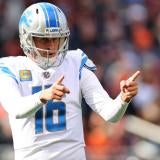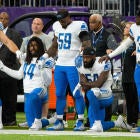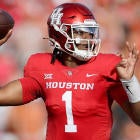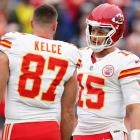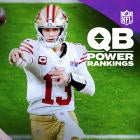On the heels of the NFL's peaceful protests being named the top sports story of 2017, The New York Times reports that classes in universities across the country are now teaching and discussing rampant "fraternity culture," including President Donald Trump's feud with the NFL over its demonstrating players.
Citing commentary from students at a Vanderbilt University business school, David Gelles and Claire Cain Miller explore the "bro" culture tied to national headlines on everything from the #MeToo movement against workplace sexual harassment to the alleged suppression of free speech through, say, Trump's demands for the NFL to punish its protesting athletes. All of it, the Times report indicates, is at the heart of many universities' attempt to incorporate contemporary concerns into education on a business realm that "is no longer just about finance, marketing, accounting and economics."
And included in that education, for some, is a focus on Trump's longstanding war of words with the NFL.
The president, who was unsuccessful in purchasing his own NFL team decades ago and also came up short with his bid to buy the Bills in 2014, said in a September rally that team owners should "fire" any player who kneels during pregame national anthems to protest social injustice. Describing former San Francisco 49ers quarterback Colin Kaepernick and fellow protesting players as "sons of bitches," he continued criticizing -- and, more than anything, tweeting about -- the NFL in subsequent months, even after the league donated almost $90 million to social causes and many protesting players engaged in accompanying community work.
University classes, the Times reports, have approached the Trump vs. NFL story with both assignments and classroom debate.
This fall, Professor [Ed] Soule [of Georgetown McDonough School of Business] assigned coursework covering sexual harassment at Uber, how companies like Amazon respond when attacked by Mr. Trump and the social justice protests by NFL players.
During one class, students debated whether players should have been more deferential to the wishes of team owners and the league, or whether the league should have supported players more vocally. The conversation grew tense when the topic turned to respect for the national anthem, and Mr. Trump's forceful response to players who continued to kneel as it was played.










